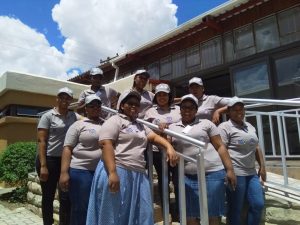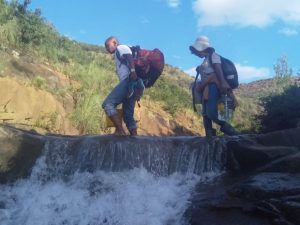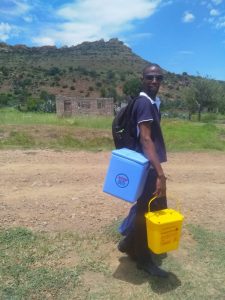mothers2mothers Lesotho Breaks New Ground by Employing Nurses
On International Nurses Day—12 May 2020—mothers2mothers (m2m) celebrates a big milestone for our organisation.

A group of Lesotho’s female nurses.
For the first time in m2m’s 19-year history, we are employing nurses—currently 11 of them, to work alongside the 328 women we employ as Mentor Mothers in Lesotho and help provide high-quality comprehensive antenatal and postnatal services to women and their families. This move into clinical services is necessary to address barriers to healthcare facing our clients in Lesotho, and ensure that we fulfil our commitment to bring health services closer to the communities we serve while alleviating the country’s overstretched healthcare system. It marks a key development in our 2018-2021 Strategic Plan, and follows hot on the heels of the news that Mentor Mothers in Zambia are now undertaking Dry Blood Spot testing.
“Lesotho may be one of the smallest countries in Africa, yet large distances between communities and health centres and lack of transport can deter women and their families from traveling to health facilities. There is an urgent need to address the barriers that make it difficult for women and families to access quality health services, particularly in Lesotho’s rural communities. At mothers2mothers, we are determined to play our part,” says Frida Kabaso, County Director of m2m Lesotho.
The decision to begin implementing clinical services in Lesotho at the end of last year was informed by the “Three Delays”—a public health model adopted by the World Health Organization to identify three types of delays that contribute to maternal mortality. The Three Delays involve delays in: 1) deciding to seek care; 2) reaching a heath facility; and 3) receiving adequate and appropriate care.
Among the reasons for the Three Delays in Lesotho:
Delay #1: Some women and families decide not to seek medical care due to fears of being ill-treated in the health facilities, cultural beliefs associated with maternal health, the fact that some female caregivers are not empowered to make decisions about their own or their family’s healthcare, and a lack of encouragement from relatives and community members to seek care.
Delay # 2: The challenges women and families face in reaching health facilities involve long distances to the nearest health facility, poor roads, absence of emergency transportation, and a lack of awareness of the health services that are available.
Delay # 3: A shortage of healthcare providers, combined with insufficient quantities of essential medicine and other supplies, make it difficult for many people in Lesotho to get the vital health services they need. “Even after an individual has sought health services and reached the health facility, there is no guarantee they will receive adequate and appropriate medical care,” says Frida.
Addressing the Three Delays with clinical services

A nurse & HIV Testing Services Mentor Mother crossing a river to get to a hard to reach community.
In order to improve access to and the uptake of quality health services in Lesotho, m2m began providing clinical services at the end of last year after discussions with and approval from our key donor in Lesotho, the United States Agency for International Development (USAID). USAID provided funding to m2m to begin implementation in two districts, Mafenteng and Mohale’s Hoek, complementing the already existing Mentor Mother Model programme operating there. We also continue to provide our core peer-to-peer services through the Mentor Mother Model in health facilities and communities in three other districts in Lesotho—Maseru, Berea and Leribe.
The nurses have been strategically placed in high volume sites and in a few low volume sites that have limited medical staff, providing clinical services in close coordination with Mentor Mothers. As part of m2m’s integrated service platform that links health facilities with surrounding communities, nurses and Mentor Mothers travel to villages twice a month to bring clinical care and support services directly to women and families, especially in the hardest-to-reach areas. They engage women and families through traditional leaders, who have great influence on who can access and work in their communities.

Male nurse going to a community outreach.
The nurses offer a range of clinical services, including home-based screening for HIV and pregnancy, initiation on antiretroviral treatment and refills, dispensing family planning advice and supplies, and infant HIV testing. Mentor Mothers continue to provide m2m’s core health and support services, encouraging women and families to seek vital health services, adhere to treatment, and stay in care through group education and one-on-one peer interactions.
To ensure this outreach is as efficient as possible, m2m Lesotho has fully digitised our service platform so that we can track our clients at both health facilities and in communities to make sure they receive the clinical care and support they need. Furthermore, m2m nurses are providing on-the-job mentorship of Ministry of Health nurses to improve the overall quality of services provided by the Lesotho health system.
Frida adds: “In order to achieve virtual elimination of mother-to-child transmission of HIV, we had to expand our services to include clinical service delivery, together with our long-standing mentorship approach, to improve the quality of care at our health centres. By doing this, we are contributing to the advancement of Universal Health Coverage, which requires a concerted effort to reduce the Three Delays so that families have an equal opportunity to access vital health services,” Frida says.
Achieving health and wellbeing for all is critical to creating a truly HIV-free generation. m2m will continue to provide services, and grow and innovate our programme, until that becomes a reality.
This project is implemented under the United States Agency for International Development’s (USAID) RISE II funding mechanism.






















